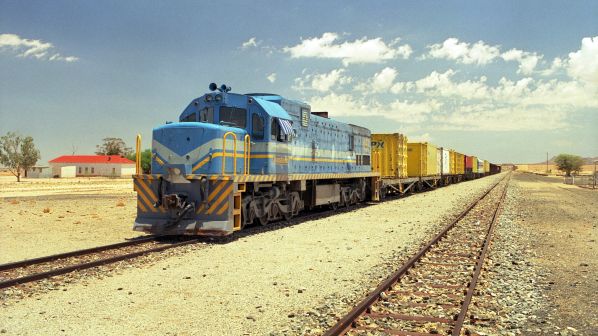The four-day workshop, which will now take place annually, was held between May 13 - 16 on the Desert Express, TransNamib’s flagship train. Visits were also held at important locations on the network including Mariental, Aus and Keetmanshoop stations.
The railway is developing a strategy to implement the Integrated Strategic Business Plan (ISBP) approved by Namibia’s cabinet in December 2018, which aims to turn TransNamib into a profitable company.
“This is the first time in two years that I have a full executive team,” says TransNamib CEO, Mr Johny Smith. “It is not only important that we come together as a team and formulate strategies to push TransNamib forward but these executives also need to visit sites, and see our operations at the ground level to fully grasp the challenges that we are facing, and those challenges are many. Unfortunately, time is not on our side and therefore there is a high priority to see how we must amend our strategy to fast-track the implementation of the business plan.”
The tour included the Keetmanshoop - Lüderitz line, which was closed for 18 years but reopened last year. The line is now a major source of revenue, carrying 15,000 tonnes of manganese per month which is set to increase to 30,000 tonnes per month. TransNamib hired 150 employees last year to assist with the transport of Manganese from Ariamsvlei to Lüderitz.
“The route travelled has become a major revenue source for TransNamib in terms of moving manganese for our customers and the executives needed to see first-hand the operations and challenges on the route,” Smith says. “We made the decision as an executive team to use our own facilities and in doing so market and showcase our facilities on the train, as a facility for workshops and strategic retreats.
“The Covid-19 pandemic has had a tremendous impact on our revenue streams. In the five weeks of lockdown we lost 50% of our revenue and we need to find innovative ways to close this gap. The Desert Express has been significantly impacted with the complete standstill of its operations. We still have to pay staff and operational costs, and with Covid-19’s devastating effect on the international tourist market, I do not foresee our income stream increasing in the next few months.”
AGM
The workshop, which was originally due to be held in March, came just over two months after TransNamib successfully hosted its first AGM in seven years on February 28, where it presented its first unqualified audit in more than a decade.
During the 2019-20 financial year, TransNamib generated revenue of $N 517m ($US 29.78m), a 10% year-on-year increase and its strongest growth in more than a decade.
Minister of public enterprises, honourable Mr Leon Jooste, said there was a new sense of confidence in the company and its new direction. “We are not out of the woods yet but we are heading there,” he says.

